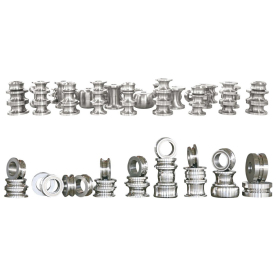Introduction
In the contemporary industrial environment, the need for efficient and high-quality production processes is more critical than ever. Among the various manufacturing technologies available, high-capacity pipe mill production lines stand out as a game-changer for industries requiring large-scale pipe manufacturing. The evolution of these production lines has revolutionized the way pipes are produced, significantly impacting numerous sectors, including construction, telecommunications, and oil and gas. This article delves into the significance, processes, and advantages of high-capacity pipe mill production lines, shedding light on their role in shaping modern manufacturing paradigms.
Understanding High-Capacity Pipe Mill Production Lines

Revolutionizing Steel Manufacturing: The Importance and Impact of High-Capacity Pipe Mill Production Lines in the Modern Industrial Landscape
High-capacity pipe mill production lines are sophisticated systems designed for the mass production of pipes. These production lines typically process various materials, primarily steel, to produce pipes of different diameters and wall thicknesses. The key features that define high-capacity pipe mills include automated processes, advanced welding technologies, and precision manufacturing capabilities. These production lines are engineered to handle high volumes without compromising quality, allowing manufacturers to meet the escalating demands of diverse industries.
The Manufacturing Process

Revolutionizing Steel Manufacturing: The Importance and Impact of High-Capacity Pipe Mill Production Lines in the Modern Industrial Landscape
The process of pipe production often begins with the preparation of raw materials. Steel coils are fed into the mill, where they undergo several steps, including uncoiling, shearing, and forming. The heart of the production line is the forming process, where the flat steel strips are rolled into a tubular shape.

Revolutionizing Steel Manufacturing: The Importance and Impact of High-Capacity Pipe Mill Production Lines in the Modern Industrial Landscape
Once the pipe is formed, welding becomes the next crucial step. Depending on the type of pipe being produced, different welding techniques may be employed, such as high-frequency induction (HFI) welding, submerged arc welding (SAW), and laser welding. These welding methods ensure strong and durable joints, vital for the pipe’s structural integrity.
After welding, the pipes undergo a series of finishing processes, including sizing, straightening, and surface treatment. Each of these processes further refines and prepares the pipes for their final applications. Finally, inspection and testing protocols ensure that the manufactured pipes meet the requisite industry standards before they are dispatched for use in various projects.
Advantages of High-Capacity Pipe Mill Production Lines
1. **Increased Efficiency**: The automation of high-capacity pipe mill production lines significantly enhances manufacturing efficiency. Processes that could take hours or even days in manual setups can now be completed in a matter of minutes. This reduction in cycle time allows manufacturers to increase output, thus meeting market demands more effectively.
2. **Cost-Effectiveness**: Higher production efficiency translates to reduced operational costs. With the ability to produce pipes at a larger scale, manufacturers can benefit from economies of scale. This reduction in cost can be passed on to customers, making high-capacity pipe mill production lines a lucrative investment.
3. **Quality Control**: Advanced manufacturing technologies incorporated into high-capacity pipe mills ensure better quality control. Automated systems facilitate precise measurements and consistent production standards, allowing for the production of high-quality pipes that meet international standards and customer specifications.
4. **Versatility**: High-capacity pipe mills can produce a diverse range of pipe sizes and specifications, making them versatile for applications across multiple industries. Whether it’s for residential plumbing, industrial processes, or large-scale oil pipelines, these production lines can accommodate various requirements.
5. **Sustainability**: As the demand for sustainable manufacturing practices grows, high-capacity pipe mills are becoming more eco-friendly. By optimizing the use of raw materials and reducing waste throughout the production process, manufacturers can minimize their environmental footprint.
Conclusion
High-capacity pipe mill production lines are at the forefront of modern manufacturing, offering an array of advantages that contribute to efficiency, cost-effectiveness, and quality. As industries worldwide continue to face challenges related to supply chain management and production scalability, the implementation of these advanced systems becomes increasingly essential. The future of pipe manufacturing looks promising, powered by technology and innovation, ensuring that sectors demanding high-quality pipes can operate effectively in an ever-evolving market. Investing in high-capacity pipe mill production lines is not only a strategic move for manufacturers but also a crucial step toward meeting the future needs of global industries.Custom-Made Spare Parts for Solid State HF Welders




